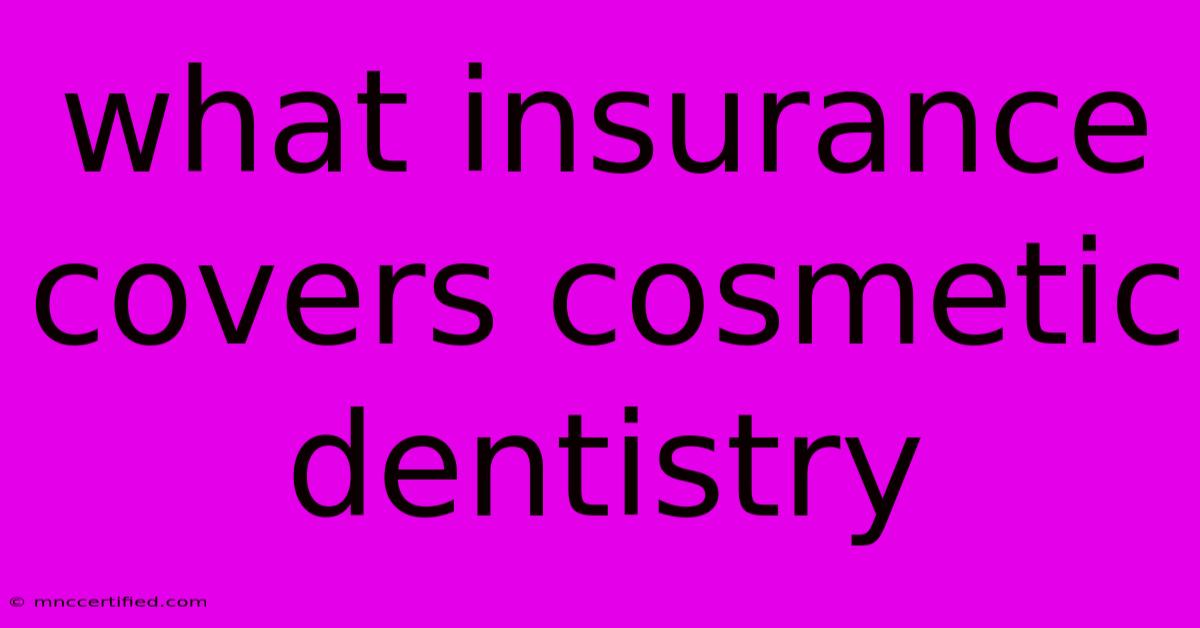What Insurance Covers Cosmetic Dentistry

Table of Contents
Does Insurance Cover Cosmetic Dentistry? A Comprehensive Guide
Dreaming of a dazzling smile but worried about the cost? You're not alone. Many people wonder if their dental insurance covers cosmetic procedures. The short answer is often, no. But, it's not always that simple.
Understanding the Difference: Medical vs. Cosmetic
The key lies in distinguishing between medically necessary and cosmetic dental work. Here's a breakdown:
Medically Necessary Dental Procedures:
- Preventative care: Cleanings, exams, fluoride treatments, x-rays
- Restorative care: Fillings, crowns, root canals, extractions, dentures (for functional purposes)
- Emergency procedures: Addressing pain, infection, or trauma
Cosmetic Dental Procedures:
- Teeth whitening: Brightening teeth to enhance their appearance
- Dental bonding: Fixing minor chips or gaps in teeth
- Veneers: Thin, custom-made shells placed over teeth to improve their shape, color, or size
- Invisalign: Clear aligners used to straighten teeth
- Dental implants: Replacing missing teeth (if primarily for aesthetic reasons)
What Insurance Typically Covers
Most dental insurance plans prioritize medically necessary procedures. While they may offer coverage for some cosmetic procedures, the extent of coverage varies greatly:
- Preventive care: Typically covered in full, encouraging regular visits and early detection of issues.
- Restorative care: Partial or full coverage, often depending on the procedure's necessity and the plan's terms.
- Cosmetic procedures: Limited or no coverage. Coverage may vary based on the procedure's purpose (e.g., restoring functionality) and the plan's specific provisions.
Factors Influencing Coverage
Several factors influence whether your insurance covers cosmetic dentistry:
- Plan type: Different plans have varying levels of coverage. Some plans may offer specific coverage for certain cosmetic procedures.
- Procedure purpose: If a procedure is deemed medically necessary, even if it also improves aesthetics, your insurance might cover it.
- Pre-existing conditions: Certain medical conditions may necessitate cosmetic procedures (e.g., dental implants for TMJ disorder).
- Deductibles and co-pays: Even if a procedure is covered, you'll likely have deductibles and co-pays to handle.
Getting the Most Out of Your Coverage
- Check your plan: Carefully review your dental insurance policy to understand what's covered.
- Discuss with your dentist: Ask your dentist about your plan's coverage for specific procedures and explore financing options.
- Explore alternatives: Consider less expensive alternatives if insurance doesn't cover a particular procedure.
- Shop around: Compare different dental plans to find one that best suits your needs and budget.
Conclusion
While insurance may not fully cover cosmetic dentistry, it doesn't mean you can't achieve your dream smile. By understanding your coverage, discussing options with your dentist, and exploring alternatives, you can make informed decisions about your dental care. Remember, investing in your smile is an investment in your overall well-being and confidence.

Thank you for visiting our website wich cover about What Insurance Covers Cosmetic Dentistry. We hope the information provided has been useful to you. Feel free to contact us if you have any questions or need further assistance. See you next time and dont miss to bookmark.
Featured Posts
-
Chelsea Vs Noah Uefa Conference League Live Stream
Nov 08, 2024
-
Historic Win Barcelona Conquers Without Messi
Nov 08, 2024
-
Interest Rates Lowered By Bank Of England
Nov 08, 2024
-
Merz Wants Accelerated Topic Timeline In Germany
Nov 08, 2024
-
Uk Doctor Endorses Hamas Armed Conflict
Nov 08, 2024